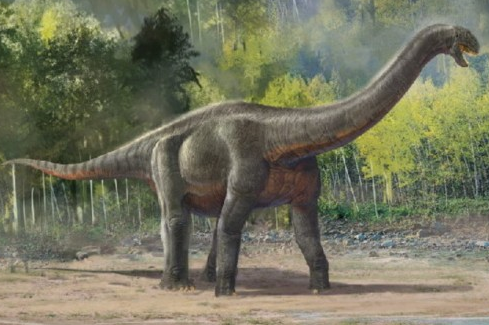But over the ages, Pangea broke up into two giant land masses, one in the north and one in the south.
随着时代的变迁,盘古大陆分裂为两块巨大的陆地板块,一块向北漂移,一块向南漂移
Probably around 100 million years ago, South America became separated.
大约是在1亿年前,南美洲分离为一个独立的大陆
And then the faunas, the dinosaurs, the mammals,
接着许多动物群落:恐龙、哺乳动物
the rest of the fauna and flora started to evolve in separate ways, in different ways, in different forms.
大部分动物群落和植物群落都开始沿着不同的方向,按照不同的方式独自进化
After the continent split, different dinosaurs evolved on each continent.
陆地板块分离之后,各种恐龙都在自己的大陆上进化
While, throughout the northern continents, the giant long-necks died out,
当北方大陆上所有巨型蜥脚类恐龙正逐渐灭亡时
down south, something extraordinary was happening.

Here, the huge long-necks not only survived, they just kept growing bigger and bigger.
在这里,巨型蜥脚类恐龙不仅活得好好的,而且越长越大
About 90 million years ago, there were not such animals this big in any other part of the world, but in South America.
大约是在9千万年前,世界上其它地方都看不到如此巨大的动物,除了南美洲
These four-legged plant-eaters, like Argentinosaurus, are a typical South American kind of dinosaur.
这些四足植食动物,例如阿根廷龙,是南美洲最典型的恐龙
In this Cretaceous Period, they were highly successful in the southern hemisphere.
在白垩纪时代,它们在南半球相当活跃
It wasn't just the long-neck plant-eaters that were different on the isolated continent of South America.
但在孤立的南美洲大陆上,不仅只是植食蜥脚类恐龙与众不同
Sealed off from the rest of the world, the vicious tyrannosaurs never reached here.



